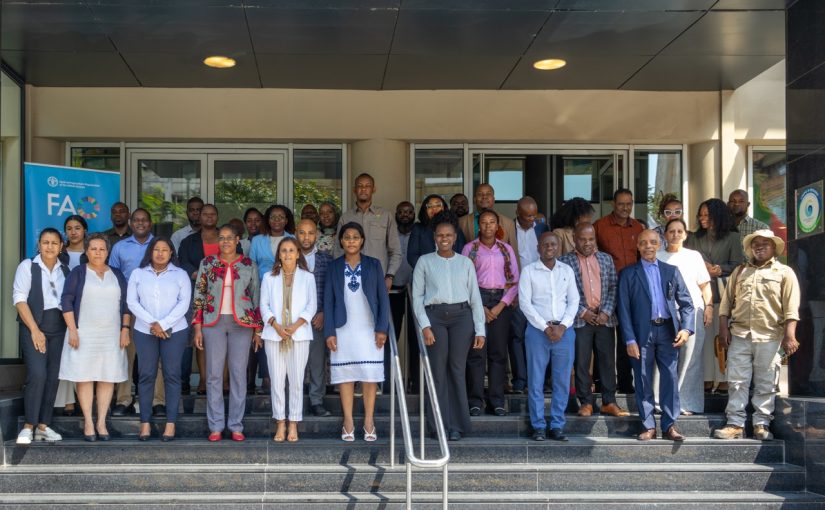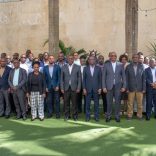Mozambique: Forestry operators call on government to set reference prices
Mozambique launches STOSAR II to strengthen agriculture and agrifood systems

Photo: FAO Mozambique /X
The Government of Mozambique, through the Ministry of Agriculture, Environment and Fisheries (MAAP), in partnership with the Food and Agriculture Organization of the United Nations (FAO), the Southern African Development Community (SADC) Secretariat and the European Union (EU), on Monday (October 13) launched the second phase of the Support to the Operationalization of the SADC Regional Agricultural Policy (STOSAR II) project.
STOSAR II (2025–2028) is a EUR 10 million initiative for 16 SADC Member States, including Mozambique, financed by the European Union under the Development-Smart Innovation through Research in Agriculture (DeSIRA) programme. Building on the results achieved under STOSAR I (2018–2024), the project aims to accelerate the transformation of agriculture and agrifood systems across the region.
Results from STOSAR I in Mozambique
During the first phase, Mozambique invested around USD 172 000 to strengthen institutional capacity, modernise information systems and reinforce surveillance of agricultural pests and diseases.
- 172 technicians trained in three core areas: 67 in Agricultural Information Management Systems (AIMS); 45 in Animal Health; and 60 in Plant Health.
- Five provinces covered: Maputo, Gaza, Inhambane, Tete and Manica.
- Two laboratories equipped to boost national capacity for pest and disease surveillance and diagnostics.
As a pilot country for the regional AIMS platform, Mozambique contributed to the AIMS Regional Strategy 2020–2025 and implemented a national data system with 12 modules covering multiple agricultural domains. The project strengthened technical skills in data collection and analysis tools such as Kobo Collect, QGIS, Power BI and STATA, and established the National AIMS Technical Committee to ensure interoperability with regional systems.
In plant health, Mozambique reinforced surveillance and containment of transboundary pests and diseases, including Fusarium TR4 (banana), Tuta absoluta, fall armyworm and maize lethal necrosis disease. Laboratory equipment—such as ELISA diagnostic kits, microscopes and pipettes—was provided to enhance national diagnostic capacity. These efforts strengthened national systems, improved regional coordination and laid a solid foundation for the scale-up envisaged under STOSAR II.
STOSAR II: consolidating progress
Building on these successes, STOSAR II will focus on four priority areas:
- Agricultural Information Management Systems (AIMS): enhance national platforms for agricultural data and knowledge to support evidence-based decision-making.
- Market Access: strengthen plant and animal health by controlling transboundary pests and diseases and by reinforcing Sanitary and Phytosanitary (SPS) systems to promote trade opportunities.
- Food and Nutrition Security (FNS): support monitoring and early-warning systems to guide timely policy responses.
- Inclusive Value Chains: create opportunities for women, youth and SMEs to participate in sustainable, climate-adapted markets.
The initiative supports implementation of the SADC Regional Agricultural Policy (RAP), adopted in 2013 to promote sustainable agricultural growth, food and nutrition security and regional integration. RAP is aligned with the Comprehensive Africa Agriculture Development Programme (CAADP), launched in 2003, and with the new CAADP Strategy 2026–2035, endorsed under the Kampala Declaration in January 2025. Through this alignment, STOSAR II will bolster food security, climate resilience, inclusive growth and agro-industrialization in Mozambique and across the region.
Statements
Government Representative (MAAP):
“STOSAR II is a commitment to producers in Zambézia, who face the fruit fly and other pests that threaten their livelihoods every day. A commitment to the food and nutrition security of our children. And a commitment to Mozambique’s place at the forefront of agrifood transformation in Southern Africa.”
FAO Representative:
“Investing in agriculture is investing in people — producers, women and youth — and in Mozambique’s future.”
About STOSAR II: a EUR 10 million (2025–2028) initiative implemented in 16 countries and financed by the European Union under DeSIRA. Implemented by FAO, in partnership with the SADC Secretariat and Member States. It builds on STOSAR I (2018–2024), which strengthened agricultural information systems, tackled transboundary pests and diseases and supported market access.
About DeSIRA: Development-Smart Innovation through Research in Agriculture is an EU initiative that supports research and innovation partnerships for sustainable, climate-smart and inclusive agrifood systems.
🇲🇿 MAAP with 🇪🇺, @FAO, @SADC_News, Mozambique launches #STOSARII (EU–DeSIRA, €10m) to strengthen AIMS, plant & animal health (SPS) and early warning—opening safer markets and building resilient agrifood systems across Southern Africa.#DeSIRA #SADC #SustainableAgriculture pic.twitter.com/ROGzt8YXDk
— FAO Mozambique (@FAOMozambique) October 14, 2025












Leave a Reply
Be the First to Comment!
You must be logged in to post a comment.
You must be logged in to post a comment.